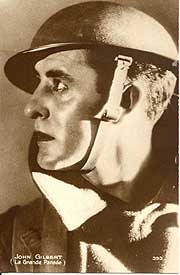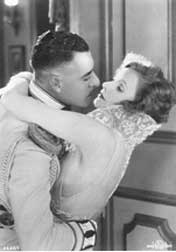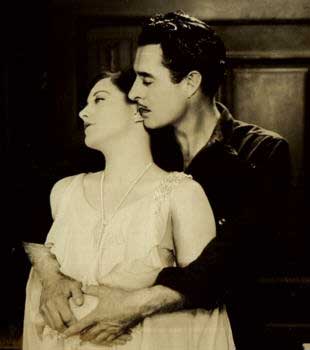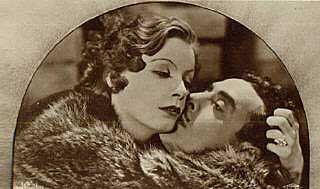|
 Gilbert
in The Big Parade, 1925
Gilbert
in The Big Parade, 1925 |
Small
At
six he’s big, he thinks, too big,
though normal for a child his age:
he
sees others like him in the streets,
running, playing stickball and hopscotch.
But he’s different. Homes, he ponders
as he watches them in their youthful
exuberance. Those children have homes,
and
I don’t have a home. Well,
he does have a home: Ida, his mother,
left him here; she often leaves him
for months, with people she hardly knows.
So now he sits on the stoop of this hard
rat-laced brownstone in this hard
New York Irish neighborhood in
the hard summer of 1905. Sweating
in the sodden heat he looks out
across the faces, the horses, the motorcars
in the street, his knickers dirty, spotted
with oil and grime and drops of urine.
They have homes, he thinks again,
sounding the words in his mind
as if they were poetry. He remembers
the dark backstages of a dozen cities,
learning words from the dog-eared scripts
left on sawdusty floors, hearing Ida spit:
Every minute the little bastard gets bigger
is a minute I’m getting older. Big, big!
He stares at the children in their dresses
and hats, imagines willing himself
smaller, smaller still, so small that
the seamstress he’s been left with
will stop yelling, stop telling him
she only has one room for God’s sake,
what does he think visitors make of him
staring moony-eyed from the corner?
(One
after another, four or five
a night sometimes, he’s left alone
for hours and then the door clicks,
rattles, bursts open to her heavy
melodious trilling. Here we are, love,
she’ll say, skeletal worm-pale woman
with bristles in her chin. He won’t
be introduced. Forget him, he ain’t
nothin’. The lights will go black
as the two of them drop onto the bed.
Sighs; creakings; a whispered Jesus
or Yes or Shit as he sits on blankets
in the corner, eyes shut tight,
fingers pressed into his ears, willing himself
away, projecting himself onto a stage
in a vast auditorium, grinning brilliantly
in flowing tuxedo and elegant tails,
applause engulfing him in warm waves,
his mother queenly in a vast frill-filled dress
and tiara, gazing adoringly up at him,
proud of him, so proud, loving him
at last, and taking him finally in her arms
and whispering, My love, it’s time to go home.)
Yes, he thinks, staring at the grime-caked
street before him, at the ice vendors and milk
wagons, at the men strolling with their cigars
and the women with their laundry baskets, if only
he could make himself small, small enough,
smaller than a dog, than a gerbil,
smaller than a baseball, she would take him
back, drop him gently into her soft pocket
where the jostling warmth would hold him
safe always. And he can do it, he’s sure,
if he tries, if he concentrates, if he puts
all his might into the attempt, and he shuts
his eyes, shuts out the shoutings and cabbage
smells of the street, tries to dissolve himself,
to shrink, expecting when he looks again
to find himself no bigger than a puppet,
or a toy soldier, or a picture in a nickelodeon:
tiny, perfect, worthy at last of home.
TOP OF PAGE

Gilbert and Garbo in Love, 1927 |
White
Dark
The
streets of Stockholm swirl
with snow, white on white so intense
that it seems to devour the dark itself,
make blinding noon at midnight.
Keta has separated from her
brother and sister, found her way
into an alley off G`tegatan,
where she hears shouting voices—
she wants to go home, but everyone
in the neighborhood knows
about the Gustafssons, Anna and Karl,
Karl the butcher who comes home
smelling of blood and brain, Anna
who can match him blow for blow,
and how the children, Sven, Alva,
and little Greta whom they call Keta escape
out the back door into the white city dark.
Sometimes neighbors take them in,
coo over them, beautiful little Keta
especially, with her huge lovely eyes
and serious ways. Keta has heard
of a place called America, where the sun
always shines in a sky always blue,
where people ride in motorcars like chariots,
where the flickers, which she, six years old
in 1911, has never seen, project faces
forty feet high that live forever. But
all that is dreamtime. Now there’s only
the alley, two drunks trying to fight
while half a dozen men cheer them on.
Blood drains from the smaller man’s
nose. She watches, remembering blood
from her mother’s nose, the doctor
in the middle of the night, his serious
words to Papi: You really must not
treat the mother of your children
this way, it’s not right, you know.
Karl humble, regretful, as he would
always be, later, tears flying down
his face, grabbing at Keta, his favorite,
hugging her close. The snow
drops everywhere, on the fighting men,
the street, the ashcans, Keta’s hair
and eyelashes. Snow, snow.
The smaller man falls and suddenly Keta
has pushed through the grownups, crying,
Stop! Stop! Can’t you see he’s beaten?
And, kneeling down, holding the man’s
head, so like that of her father,
the same unfocused eyes and boozy stench,
she cradles it as she does her father’s,
using the hem of her dress to wipe the blood
from his face, blood mixing with snow
in her dress as she whispers, again
and again, like a mantra she’ll chant
all her life: Beaten, beaten, beaten.
TOP OF PAGE
Charity
Ward
Twelve
years old, thirteen, she takes her father
each week to the charity ward, blue water-streaked
walls, broken chairs, sits him down among
shadow-eyed prostitutes, rickety tuberculars.
He’s made an effort this time, isn’t drunk.
"Sober as a stone," he’d said proudly that morning,
to any in his family who would listen. Only Keta
did. He’s convinced that what’s wrong with him
won’t be wrong with him if he’s sober—after all,
it’s the brannvin that’s causing it, isn’t that
what the doctor said? Keta remains with him
during the exam, even when she’s asked
to leave: "No, she stays with me," he declares.
He strips off his shirt, exposes his pallid, lumpy
body, the doctor taps his back, listens to his heart.
"Karl," he says confidentially, leaning close to him
as if he wishes Keta not to hear, "you simply must
stop drinking. Don’t you know that?" Her father
nods humbly, thanks the white-coated man, puts on
his shirt and tattered Homburg hat. "I stopped
already," he says to her on the way home, suddenly,
indignantly. "Doesn’t he know that? Sober as a stone,
as a stone. Keta," he says finally, "you go on
home, yes? Papi has people he needs to see."
She obeys, always, always obeys, kisses him
on his stubbly cheek, says so long, Papi,
be well, moves up G`tegaten toward the slums
and home, glancing back only once
to see him chatting with friends, tipping
his head back, flask to his lips: happy, she thinks,
as a boy, a boy finishing a race, or a test, or a boy
helping his girl up the steps to the abortionist’s office.
TOP OF PAGE
Camera
Sixteen
and he’s the damn fool
grinning into the camera as he
gallops past on a white steed,
one of thirty-eight Yankees.
Later he’ll slip into a Rebel’s uniform,
charge back the other way;
spliced, the thirty-eight of them
will ambush themselves. Such
madness! Such fun! He loves
to sneak into the rushes, gaze up
at the glowing images as they
careen forward and back, are
slowed, stopped, started again,
and he glimpses himself now and then,
bright white face in a white sea.
But this day he sinks into his seat,
lowers his cap over his eyes as
the producer waves his cigar
at the screen and screams,
Who’s that idiot looking
into the camera? They stop
the picture, slowly reverse it,
thread one frame at a time through
the projector until, yes, there he is,
Jack Gilbert, caroming by in a blur
but not quite a blur, his head turned
straight to the camera, grin gleaming
out to the world. Fire that son
of a bitch! the producer bellows,
gesticulating wildly, and an underling
assures him it will be done, sir. But
the next day Jack reports to work
as usual, attacks himself as usual,
whoops and roars with the rest
and, every now and then,
steals a secret rascal’s glance
straight into the camera’s eye.
TOP OF PAGE
America
A
few films and she’s famous, a little,
in her little country, she and The Director.
But this is nothing, he scoffs: Peasants!
Farmers! Garbage-eaters! America,
America it must be, and soon is:
goodbyes at the dock, Greta weeping
into her mother’s bosom, The Director
checking his watch again and again.
They sleep chastely, in different cabins,
despite her pleas that they stay together,
not for any indecent reasons, God no,
but just for company, companionship.
Stupid little schoolgirl, he mutters,
slamming his door in her face.
She’ll
wander the deck for hours
at night, breathing the sea-spray,
imagining dropping away into space,
splashing down through the depths
to live with sharks and squid.
When she sleeps at last
the ship will be a mausoleum,
her dark cabin a coffin, and in the morning
he’ll kill her, obliterate her with
a few words and sheets of paper:
You
must forget Keta Gustafsson.
Think of her as dead. And so she becomes
someone new, newly named. Alone, she’ll try
the syllables on her tongue: Gar. Bo. Gar-bo.
Greta Garbo, she thinks, heading
to America: to paradise, to greatness,
part bright star, part shambling corpse.
TOP OF PAGE

Joan Crawford and Gilbert in Twelve Miles Out, 1927 |
The
Studio Lot at Midnight
Arms
interlocked, the silence between them warm
and content, there’s no other place they can even imagine
wanting to be. How real, this: Dodge City or Amazon jungle,
Paris or darkest Africa, all empty, uninhabited worlds
entirely theirs to share, without agents or makeup men
or producers or fans jostling them on the street cadging
an autograph, a touch, a buck from Gilbert or Garbo who seem,
sometimes, to themselves, less real than dreams; roles,
put-ons that others animate, keep alive, love, try
to tear down. Here, now, nothing is wanted of them
by anyone. They live, for a few minutes at least, only
for each other. Their shoes scuff softly through the dark
interstices, worlds between worlds, neither of them in any
hurry to reach Athens or Rome, happy to pause in Bethlehem
or even Hollywood, to share a cigarette, a word, a slow kiss,
their only abiding company the patient and radiant stars.
TOP OF PAGE
Movie photos courtesy
of http://www.johngilbert.org/
The John Gilbert Appreciation Society.
|
